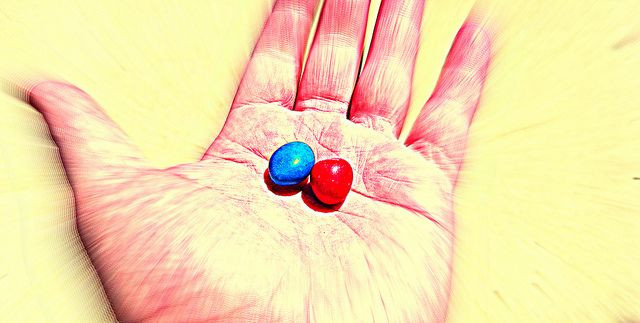Have Difficulty Swallowing Pills? How A Spoonful Of Water Can Help The Medicine Go Down

Swallowing pills could be one of the most dreaded things you come face-to-face with when you’re ill. Whether you used to hide them under your tongue and spit it out as a kid or just refuse to take them now as an adult, science has given merit to the “Mary Poppins method.” According to a recent study published in the journal Annals of Family Medicine, “a spoonful of [water] makes the medicine go down” simply by using the pop-bottle method for tablets or the lean-forward method for capsules.
“A hard pill to swallow” isn’t just a metaphor in medicine. One in three people tend to gag, vomit, or choke, according to a review published in Therapeutic Delivery, when it comes to swallowing oral medication. This keeps people from sticking to their medication, which can lead them to become sicker. The difficulty of swallowing pills happens to people who can swallow food and liquid just fine. However, some people have an aversion to swallowing pills and others have physical limitations that inhibit their swallowing capabilities.
In an effort to make swallowing pills easier for patients, Dr. Walter Haefeli, lead author of the study and clinical pharmacologist at the University of Heidelberg, Germany, and his colleagues aimed to evaluate the influence of two techniques on swallowing tablets — the pop-bottle method for tablets and the lean-forward method for capsules. A total of 151 adults were given 16 differently shaped placebos, adding up to 283 pills between them in the study. The participants were taken from the general German population, including those with complications swallowing and those without.
They were asked to compare swallowing these pills against swallowing 20 milliliters, or about a tablespoon of water. The participants were instructed to swallow the most difficult pills using either the pop-bottle or lean-forward techniques and rate this against just water on an 8-point Likert scale. The pop-bottle method involved filling a plastic bottle with water, placing the tablet on the tongue and clamping the lips tightly around the opening of the bottle before beginning to drink, The Guardian reported. The lean-forward technique is where the capsule is again placed on the tongue before taking a sip of water. The participants had to tilt their chins toward their chests and swallow with the head bent forward.
The findings revealed tablet swallowing improved by up to 60 percent using the pop-bottle method compared with standard techniques such as using a sip of water from the glass. The lean-forward method proved to be 88 percent more effective at helping patients swallow capsules than more common techniques. These findings could help ensure patients who struggle to take all of their medication actually take their prescription effectively.
"Almost 10 percent of patients with swallowing difficulties report that this is a reason for not taking the drugs at all. Both the techniques we describe were remarkably effective in participants with and without reported difficulties in swallowing pills and should be recommended regularly," Haefeli told The Guardian. He does warn this study isn’t the last word on pill-swallowing techniques, but it’s a bold start.
However, it’s important to acknowledge the way tablets and capsules are swallowed does matter because of their density. Most of the time, tablets have higher densities than water, so it is vital to swallow the medicine into the pharynx — the cone-shaped passageway that goes from the nose and mouth toward the esophagus and voice-box. Unlike tablets, capsules are less heavy than water, which makes it more probable they float on the water in the mouth. Tilting your head back will allow it to float toward the teeth and then tilting your head forward will help the capsule move toward the throat.
Researchers still remain inconclusive as to why some people have difficulties swallowing pills. However, the majority of the people simply face a mental barrier that could easily be overcome, Medical Daily previously reported. A trigger for the fear response ignites because of the disconnect between the body and mind when the brain realizes the pill isn’t food but it is yet asked to treat it as such.
It seems patients without a physical dysfunction need to train themselves to mentally block out their pill-swallowing fears, and pharmaceutical companies need to consider making tablets smaller to encourage patients to adhere to a full course of prescription.
Sources: Haefeli WE, Quinzler R, Reich G, Schiele JT, Schneider H. Two Techniques to Make Swallowing Pills Easier. Annals of Family Medicine. 2014.
Llorca PM. Discussion of prevalence and management of discomfort when swallowing pills: orodispersible tablets expand treatment options in patients with depression. Therapeutic Delivery. 2011.
Published by Medicaldaily.com



























